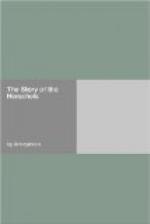But before this well-deserved good fortune fell to him, Herschel continued his industrious career as both musician and astronomer. During the concert season, which lasted five or six months, he had never a night disengaged, but was conducting oratorios at Bath or Bristol, arranging for public concerts, attending rehearsals, and superintending the performances of his choir. As soon as a lull came, the indomitable man, assisted by his faithful sister, returned to his astronomical pursuits. To gain a fuller and clearer knowledge of the starry worlds scattered over the vast fields of space, Herschel from the first had seen that instruments of much greater power were necessary than any hitherto used by astronomers. He set to work, therefore, on the construction of a thirty-foot telescope; the metallic mirror of which must, of course, be of proportionate dimensions. This huge mirror was to be cast in a mould of loam prepared from horse-dung, of which an immense quantity was to be pounded in a mortar, and sifted through a fine sieve; an arduous and almost endless task, undertaken by Caroline Herschel and her brother Alex. Then a furnace was erected in a back-room on the ground-floor; and every preparation having been made, a day was set apart for the casting. The day came, and Herschel and his collaborateurs looked forward to the consummation of their hopes. The metal was placed in the furnace; but, unfortunately, just when it was ready for pouring in a molten stream into the mould, it began to leak, and both the Herschels, and the caster with his men, were compelled to fly from the apartment, the stone flooring exploding, and flying about in all directions, as high as the ceiling. The astronomer, exhausted with heat and exertion, fell on a heap of brickbats; exhausted, but not dismayed. The work was renewed; and a second casting being attempted, it proved entirely successful, and a very perfect metal was formed in the mould.




